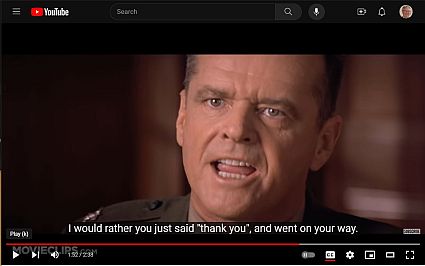One of my favorite movie scenes is Jack Nicholson’s soliloquy in A Few Good Men and the famous line, “You can’t handle the truth…!”
I worry whether “we” can’t handle the truth. I and others have become broken records. Post after post, we cite examples and data that indicate something is broken. As sellers, we would hope that customers would want to engage us, but the reality is they do everything the can to minimize their need to engage selling. But we persist in the behaviors that drive customers away.
We complain about how we are sold to. We share bad prospecting outreaches, our aversion to answering the phone and the decline in quality of our social feeds. Yet these behaviors persist.
But, as I look more broadly, I worry about the tendency in too many organizations to avoid the “truth.” We see, almost daily, things aren’t working–or at least as well as they should be. We struggle to get results. We do more, yet more produces less. We add technology, but technology doesn’t really change what we are doing, it just makes us more efficient at producing worse results.
If we recognize the need to change, we change the wrong things. We may change the people, asking them to do the same things their predecessors have done. We may change some of the programs, or techniques, or the technology, but they are overlays to what we have always done.
Too often, we somehow hit our goals, but we do so at terrible win rates or excessive costs of selling. We fail to recognize we should be performing better for these investments.
And too often, we don’t take the time to reflect on the facts. The “truth” is we can’t continue doing the same things in higher volume and velocity. We have to change, we have to re-invent what, how, and why we do things.
If something is broke, ignoring it doesn’t fix it. We have to have the courage to recognize we can do better. We have the responsibility to face facts, figuring out what we do, how we must change to improve and more effectively achieve our goals.
It’s fascinating, when we do this with organizations, figuring out what we must do to improve isn’t that difficult. Once we confront the truth, smart people can figure ways to fix it. We can improve, and the time to results can often be pretty quick.
But we have to recognize and admit to ourselves, we should be doing better.
Action Item: If you are a leader, sit down with your team, honestly looking at the data and performance trends. Identify one area you need to change, something that isn’t working. Figure out what you might do differently. This is not doing more of something or doing it faster, look at a completely different and new approach. Make the change and commit to executing it for the next 90 days. Keep iterating through this process.
If you are an individual contributor, do the same thing. Look at your personal performance data, identify one thing you want to change and do it. Experiment for 90 days, refine what you are doing until it works consistently. Then, once you have that locked in, find another change, then another.

Leave a Reply